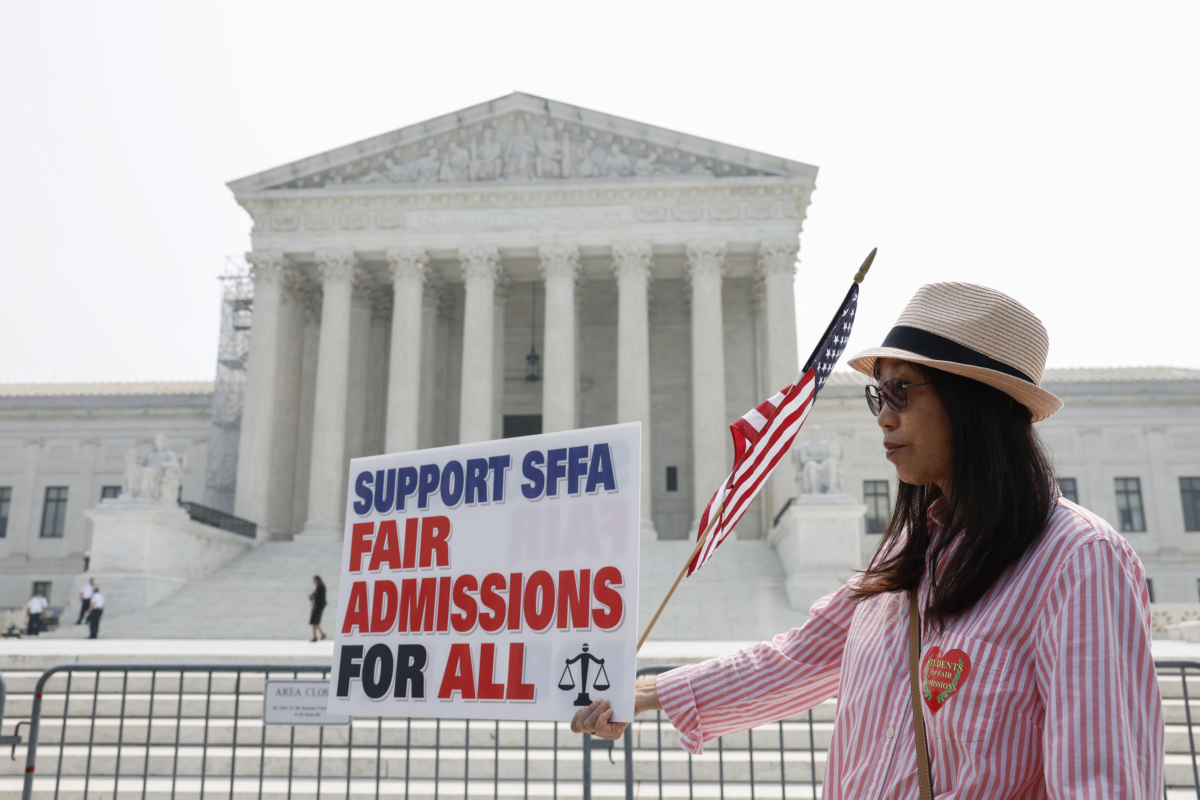


A recent ABC News/Ipsos poll found most Americans agreed with the Supreme Court’s recent rulings in three high-profile cases.
The majority of Americans, 52 percent, approved of the decision against race-based admissions in higher education, while 32 percent disapproved.
The court’s ban on affirmative action-based admissions was the result of its hearing two cases—originally filed in 2014—that were brought by Students for Fair Admissions (SFFA), with the first against Harvard College, and the second against the University of North Carolina (UNC) Chapel Hill.
In the Harvard case, a points-based system was found to have been used in the admissions process where race was a specific factor, and the school’s capping of the number of Asian applicants was deemed impermissible. In the UNC case, the school was found to have disadvantaged white applicants in favor of black applicants.
The majority of poll respondents believed students of all races had a fair chance of getting into the college of their choice.
When it came to white students, 67 percent of Americans believed they had a fair chance, while 22 percent believed they had an unfair advantage and 9 percent believed they had a disadvantage. Regarding black students, 47 percent thought they had a fair chance while 15 percent thought they had an unfair advantage, with 36 percent believing they had an unfair disadvantage.
Half of respondents said Hispanic students had a fair chance, while 12 percent thought they had an unfair advantage and 37 percent an unfair disadvantage. Sixty-five percent of respondents thought Asian students had a fair chance, while 11 percent thought they had an unfair advantage and 22 percent thought they had an unfair disadvantage.
When it came to American’s approval of the court’s rulings on two other cases, the margins were narrower.
Forty-five percent approved of the court’s decision to strike down the Biden administration’s student loan debt cancellation plan, while 40 percent disapproved.
The ruling in a forced speech case that allowed a Christian website designer to refuse to provide services for a same-sex wedding website had the narrowest margin, with 43 percent approving and 42 percent disapproving.
The court’s 6-3 rulings have drawn considerable attention.
Nine justices comprise the nation’s highest court, with Chief Justice John Roberts and Justices Samuel Alito, Amy Coney Barrett, Neil Gorsuch, Brett Kavanaugh, and Clarence Thomas appointed by Republican presidents, and Justices Ketanji Brown Jackson, Elena Kagan, and Sonia Sotomayor appointed by Democratic presidents.
The majority of Americans—some 53 percent—believed that, in their recent decisions, the justices were ruling “on the basis of their partisan political views” rather than “on the basis of the law,” at 33 percent.
This was an increase of 10 points from when the same question was asked in an ABC News/Ipsos poll conducted in January, 2022. Pollsters noted that respondents who agreed with the rulings were not equally split down partisan lines: the debt cancellation plan ruling received approval from 71 percent of respondents who vote Republican, and just 17 percent of those voting for Democrats.
Lawmakers—and justices—have expressed similar views.
Federal legislators have been sharply divided on the recent Supreme Court rulings—right down partisan lines. Republicans have applauded the conservative-majority court’s decisions, while Democrats have accused the justices of overreach.
On race-based admissions, or affirmative action, Republicans referenced the equal protection clause under the 14th amendment, with some going a step further by describing the rulings as victories.
“The Supreme Court made the right decision today. Colleges should not be able to discriminate against applicants based on the color of their skin,” wrote Sen. Thom Tillis (R-N.C.) in a Twitter post.
Rep. Young Kim (R-Calif.) also took to Twitter, writing that “Today’s decision is a huge victory for students of all backgrounds. All students should be able to achieve their American dream. Race-based education policies divide our nation, undermine global competitiveness, and prevent students from reaching their full potential.”
On student loan debts, Republicans broadly commended the court’s decision. Democrats, however, urged President Joe Biden to use executive action to ensure student loan debt cancellation in the wake of the court’s decision.
“The President of the United States cannot hijack twenty-year-old emergency powers to pad the pockets of his high-earning base and make suckers out of working families who choose not to take on student debt,” said Senate Minority Leader Mitch McConnell (R-Ky.). “The Court’s decision today deals a heavy blow to Democrats’ distorted and outsized view of executive power.”
Sen. Elizabeth Warren (D-Mass.) disagreed with her Republican colleague. “This fight isn’t over. The President has additional legal tools to cancel student debt—and he should use them. This Supreme Court needs to follow the law, not make policy decisions,” Warren wrote on Twitter.
Just hours after the decision, Biden announced a new student debt relief plan. The original plan had been proposed under the HEROES Act—an action the court deemed beyond the scope of the executive branch’s legal authority. The president said his new plan would be based on the Higher Education Act, though he did not offer specifics on Friday.
Some Supreme Court justices also made reference to partisan politics in their recent opinions, accusing their colleagues of voting in line with political preferences rather than legal interpretation.
In Chief Justice Roberts’s opinion on the student debt relief case, he said that reading such accusations from Supreme Court justices was “disturbing.”
“It has become a disturbing feature of some recent opinions to criticize the decisions with which they disagree as going beyond the proper role of the judiciary,” he wrote. “It is important that the public not be misled either. Any such misperception would be harmful to this institution and our country.”
